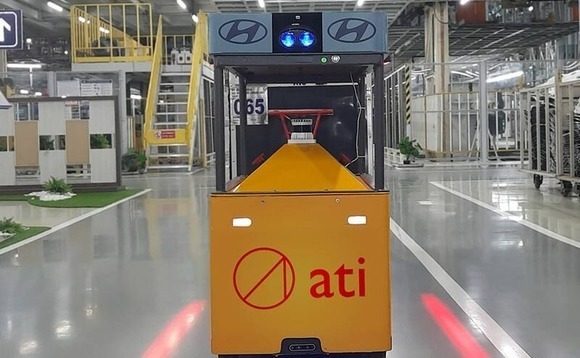
Deal focus: Exfinity seizes rare India robotics opportunity

India’s Exfinity Ventures stepped out of its comfort zone with Ati Motors. Now it’s helping the industrial robotics supplier go global with autonomous forklift-style machines that can roll in and out of buildings
Seed investors in India see few robotics companies, but they're not necessarily afraid to take the plunge when they do. One factor offsetting the unfamiliarity of the segment is its relative protection from copycats.
"In hardware, there's a learning curve, and anyone who is trying to do this – whether you're copying it or it's your own idea – has to go through that learning curve," said Nihar Ranjan, a general partner at Exfinity Ventures.
"That's in use-cases, supply chain, and everything that makes the final product. If you try to copy hardware in a new factory, little differences like the angle of ramp can create difficult challenges. It's not like software."
Exfinity made its first robotics investment in 2021, providing Ati Motors with its first institutional backing in a USD 3.5m seed round alongside Blume Ventures. Last week, it re-upped in a USD 10.8m Series A featuring Blume and Athera Venture Partners, as well as Silicon Valley-based True Ventures and MFV Partners.
Exfinity's learning curve with Ati started in 2018, when it was introduced to a company that had only a prototype and a sense that it wanted to pursue industrial applications rather than consumer. It took 1.5 years to develop its first product, and the first customer, Bosch India, was secured in early 2020, facilitating the seed round.
The Series A coincides with the launch of a new generation of products that have more versatility and load capacity. These are box-shaped droids on wheels, outfitted with platform tops that are basically conveyor belt sections that can be pressed up against one another to pass along items.
Ati's robots move autonomously around industrial sites, essentially replacing forklifts and manual equipment moving. They are guided by the same LiDAR technology used in autonomous cars, as well as purpose-built artificial intelligence and computer vision systems. Faults, when they occur, are usually software related.
Early traction was hard won, with the pandemic impeding testing programmes and limiting sales outreach to a domestic market with little need for labour-saving robots. Bosch, however, contracts a significant number of untrained workers at its India operations, which slows down production and erodes overall service quality.
"The demand in India surprised us. They're not using it as a cheap labour product – they're using it as an efficiency product. It improves efficiency a lot in the night shift," Ranjan said. "When you're in production mode and missing a part, production will be delayed. With automation, that problem is not there."
Ati entered the US about six months ago and has secured some customers in the market. Most of its clients between the two countries are in auto parts supply; they also include Hyundai, TVS Motors, and Indian tyre manufacturer CEAT.
Discussions are underway to expand into Southeast Asia and Mexico in the near term. By next year, new products targeting new industries are hoped to be rolled out. Ati has some experience in serving pharma industry facilities. The chemicals, maritime, and injection moulding industries are also under consideration.
Exfinity sees Ati as a long-term project. Indeed, it decided to make the company's Series A the first deal from its latest fund, contemplating an extended gestation period. Fund III closed on INR 5bn (USD 61m) last March.
Comfort has come from two core advantages. First, Ati was seen as filling a relative scarcity in autonomous material handling. Second, deployment is faster than most industrial robotics players because the machines can roll on a variety of surfaces. In a mixed industrial park context, this means going inside and outside of factories and warehouses.
"With most robotics companies, you need to tailor make the floor for them, so they mostly get deployed in greenfield projects and it takes time," Ranjan. "Once we close a sale, we can deploy our product in just one or two weeks. You don't need to change anything in the factory set-up or build anything from scratch. That was a motivation."
Latest News
Asian GPs slow implementation of ESG policies - survey
Asia-based private equity firms are assigning more dedicated resources to environment, social, and governance (ESG) programmes, but policy changes have slowed in the past 12 months, in part due to concerns raised internally and by LPs, according to a...
Singapore fintech start-up LXA gets $10m seed round
New Enterprise Associates (NEA) has led a USD 10m seed round for Singapore’s LXA, a financial technology start-up launched by a former Asia senior executive at The Blackstone Group.
India's InCred announces $60m round, claims unicorn status
Indian non-bank lender InCred Financial Services said it has received INR 5bn (USD 60m) at a valuation of at least USD 1bn from unnamed investors including “a global private equity fund.”
Insight leads $50m round for Australia's Roller
Insight Partners has led a USD 50m round for Australia’s Roller, a venue management software provider specializing in family fun parks.







